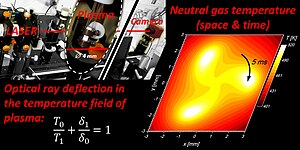
Laser schlieren deflectometry (LSD) is a method for a high-speed measurement of the gas temperature in microscopic dimensions, in particular for temperature peaks under dynamic conditions at atmospheric pressure. The principle of LSD is derived from schlieren photography: a narrow laser beam is used to scan an area in a gas where changes in properties are associated with characteristic changes of refractive index. Laser schlieren deflectometry is claimed to overcome limitations of other methods regarding temporal and spatial resolution.
The theory of the method is analogous to the scattering experiment of Ernest Rutherford from 1911. However, instead of alpha particles scattered by gold atoms, here an optical ray is deflected by hot spots with unknown temperature. A general equation of LSD describes the dependence of the measured maximum deflection of the ray δ1 on the local maximum of the neutral gas temperature in the hot spot T1:
where T0 is ambient temperature and δ0 is a calibration constant depending on the configuration of the experiment.
Laser schlieren deflectometry has been used for investigation of the temperature dynamics, heat transfer and energy balance in a miniaturized kind of atmospheric-pressure plasma.
See also
References
- Schäfer, J.; Foest, R.; Reuter, S.; Kewitz, T.; Šperka, J.; Weltmann, K.-D. (2012). "Laser schlieren deflectometry for temperature analysis of filamentary non-thermal atmospheric pressure plasma". Review of Scientific Instruments. 83 (10): 103506–8. Bibcode:2012RScI...83j3506S. doi:10.1063/1.4761924. PMC 3494719. PMID 23126765.
- Schäfer, Jan; Bonaventura, Zdeněk; Foest, Rüdiger (15 July 2015). "On the fundamental relation of laser schlieren deflectometry for temperature measurements in filamentary plasmas". European Physical Journal AP. 71 (2): 20804. Bibcode:2015EPJAP..7120804S. doi:10.1051/epjap/2015140491.
- Schäfer, J.; Sigeneger, F.; Foest, R.; Loffhagen, D.; Weltmann, K.-D. (14 September 2010). "On plasma parameters of a self-organized plasma jet at atmospheric pressure". The European Physical Journal D. 60 (3): 531–538. Bibcode:2010EPJD...60..531S. doi:10.1140/epjd/e2010-00222-5. S2CID 16507361.
